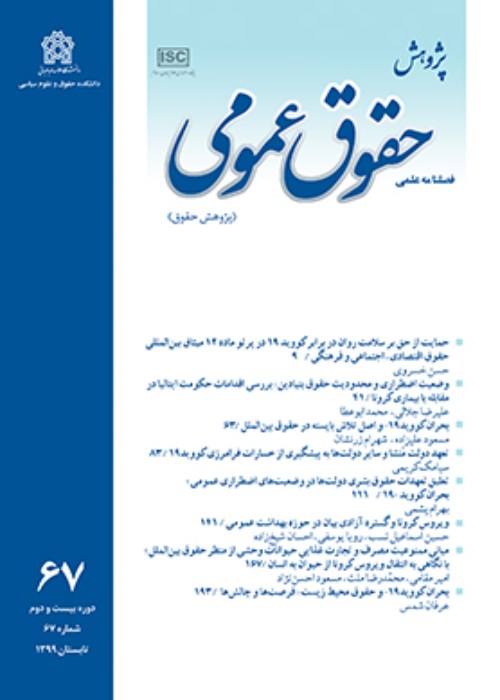Internationalization of Constitutional Laws; Opportunities and Challenges
In today's world, with phenomena such as globalization, rapid changes in the international arena, and their effects on human rights and freedoms, the significance of the internationalization of constitutional laws as a link between the public laws of states and international law is growing daily. Initially, constitutions were primarily considered as national documents confined within a country's borders. However, this perspective no longer holds in the era of globalization. constitutional rights, as a subset of public rights, are no exception. Nevertheless, the internationalization of constitutional laws continues to face numerous challenges and raises many controversies. For instance, if a domestic constitution is influenced by international law, it might undergo substantial changes. This process reflects that national constitutions are essentially part of a broader international legal framework. The inclusion of human rights in domestic constitutions, the increase in the convergence between national and international constitutions, and the alignment of the legal systems with the global market all contribute to the internationalization of constitutions. Furthermore, in entities like the European Union, internationalization occurs partially or regionally which forms the legal framework for the member states. Additionally, focusing on shared ideological principles among governments can lead to the transnationalization of certain constitutional principles. This not only serves to hold governments accountable but also allows for a comparative assessment of judicial practices concerning common issues. In general, the internationalization of constitutional laws can be viewed as a tool to curb the political powers of the government and officials within the framework of harmonized and effective legal principles. This article introduces and explores different facets of this process.
Research Questions:
What are the opportunities and challenges before the internationalization of constitutional laws?
What sets the ground for the creation and the status of cross-border principles, and what is their impact on national constitutions?
Literature Review:
In delving into the research background on the internationalization of constitutional laws, it is pertinent to consider factors such as governments' accession to documents related to or containing provisions on international human rights and the shifts in the global legal atmosphere. These steps signify changes in the global legal thinking that play a role in shaping the constitutions of nations. The influence of regional organizations like the European Union in instigating changes in the constitutional laws of member states is also noteworthy. These regional interactions can directly affect the constitutional laws of member states in economic, legal, and political aspects. In this context, many articles have examined the intricate interplay between the Constitution, international law, and global governance[1], as well as the potential for the internationalization of constitutions in different countries through adherence to international documents.[2] However, few sources have tackled the existing challenges and the future prospects.
This research is fundamental research, employing a library-based method to collect and review data from documents, books, writings, articles, and foreign sources. In terms of research methodology, this study follows a non-comparative approach wherein it first delves into the factors and the driving forces behind the shift toward internationalization of fundamental laws, the second part focuses on delineating and explaining partial or regional internationalization and the associated challenges, and finally, the third part presents the outlook of this initiative.
This research aims to provide an in-depth understanding of the role of international human rights in national constitutions and the extent to which governments adhere to these documents. It also seeks to elucidate the impact of changes in global legal thinking on the constitutional frameworks of countries and their alignment with international law. The study investigates the role of regional organizations such as the European Union in promoting and facilitating the internationalization of constitutional laws in specific regions and how they affect the methods for adapting and formulating constitutional laws. In conclusion, the study finds that firstly, despite the debates among legal scholars, transnational principles are not always universally applicable, sometimes they are specific to particular geographical regions or their religious beliefs. furthermore, these principles allow oversight of governments and dual control through the application of binding domestic and international mechanisms. additionally, they enable a comparative examination of the judicial practices across different countries on common issues. In conclusion, the essay provides that the internationalization of constitutional laws can serve as a tool to underpin the restraint of political powers within the framework of harmonious and effective legal principles.
- حق عضویت دریافتی صرف حمایت از نشریات عضو و نگهداری، تکمیل و توسعه مگیران میشود.
- پرداخت حق اشتراک و دانلود مقالات اجازه بازنشر آن در سایر رسانههای چاپی و دیجیتال را به کاربر نمیدهد.



